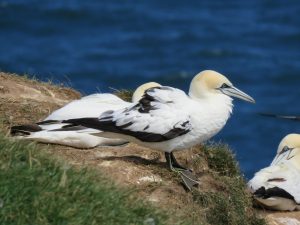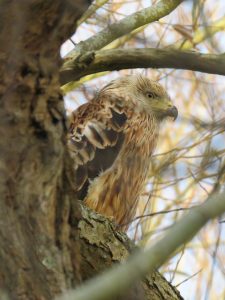“Bird Flu”
Highly Pathogenic Avian Influenza (HPAI) aka ”Bird Flu”
Readers will probably be aware of bird flu or HPAI amongst domestic poultry. Causing distress to farmers and concern about the availability of Christmas turkeys. There are also risks to egg production if domestic poultry farms continue to be affected by outbreaks of the disease. We already know that there have been some very significant impacts on wild bird populations. Over 60 species in the UK having been affected by the disease. There are many things not yet known about this outbreak.
Bird flu, like human flu, is around every year. The strain that is currently causing concern was first identified as a problem in 2021. It is still affecting both domesticated and wild birds. At the start of 2022, ornithologists became alarmed. Barnacle geese that winter on the Solway Estuary begun to die of the disease. It is estimated that 3,000 to 4,000 birds died. Even for large birds like geese, finding corpses on vast areas of salt marsh is not an exact science. The numbers involved amounted to about 30% of the winter population on the Solway. It soon became obvious that flocks of other species of geese and swans were in particular being affected.
Disasterous Summer

In the UK, the summer of 2022 was a disaster from some of our colonial seabirds. Species for which our sea cliffs and offshore islands provide nesting places for a high proportion of the European population.
Birds that breed very close together were seemingly worst affected. Gannets, great skuas, auk species and terns were particularly badly hit. Some breeding colonies seemed to remain free of the virus. However, once an outbreak occurred, very high numbers of deaths were recorded. The disease was also found in seal populations, presumably caused by seals catching and eating injured birds.
Roseate Tern
There were some particularly distressing accounts. Coquet island, off the Northumberland Coast is home to the main English breeding site of the globally rare, roseate tern. A dedicated group of wardens has spent years protecting this species. Even designing a new “nest box” to reduce predation of eggs and chicks. Painstakingly, the number of nests each year was increased from a handful to over 100.
With the arrival of bird flu the island became out of bounds. This was a restriction to prevent the spread of the disease to domestic poultry. The wardens were finally allowed to return the dead corpses and unhatched eggs suggested a major loss of birds. There is a worrying wait until early summer 2023 to discover whether this colony still exists.
Much nearer home, the Peregrine Falcon family at Leicester Cathedral was wiped-out. Adult and this year’s young bird corpses were found below the site and have been confirmed as HPAI victims. The site has since been re-occupied by a single bird which is a hopeful sign for the future. This is potentially an immature bird from a previous year.

Small Birds & Scavengers
No one seems to know yet to what extent our small birds are affected. Not many corpses of small birds ever get found. Neither do we know whether species that eat corpses contract the disease.
Red kites eating dead geese and swans was a frequent sight at some of our reservoirs this autumn. However, there have been no reports of numbers of Kite corpses. We must hope that scavengers are not significantly affected.
Picture of a magestically looking Red Kit is shown opposite.
How does this affect the human population?
Hopefully, turkey will still be on the table later this month. Even if there is a shortage of birds, we have other options. There is always a risk that viruses in birds and other mammals can mutate to affect human populations. It is still possible that COVID will eventually be confirmed as having started in bats or other wild animals.
Protect Yourself
To protect yourself from any risk, however slight, the following recommendations are still in place:
- do not handle any bird corpses that you find. If you need to remove them, use plastic gloves as a minimum. Wash your hands thoroughly after disposing of the corpse
- keep your dog away from any dead bird(s) that you encounter
- maintain a strict hygiene regime when using birdfeeders. Regularly wash feeders in mild detergents. If you have more than one feeder, by spacing them out around the garden
- telephone “Defra” Tel:03459335577 to report any corpse of a bird of prey or owl. Report any three corpses close together of waterbirds, or any five corpses of gulls or other species
David Scott




 Methodist Matters – December 2022
Methodist Matters – December 2022

